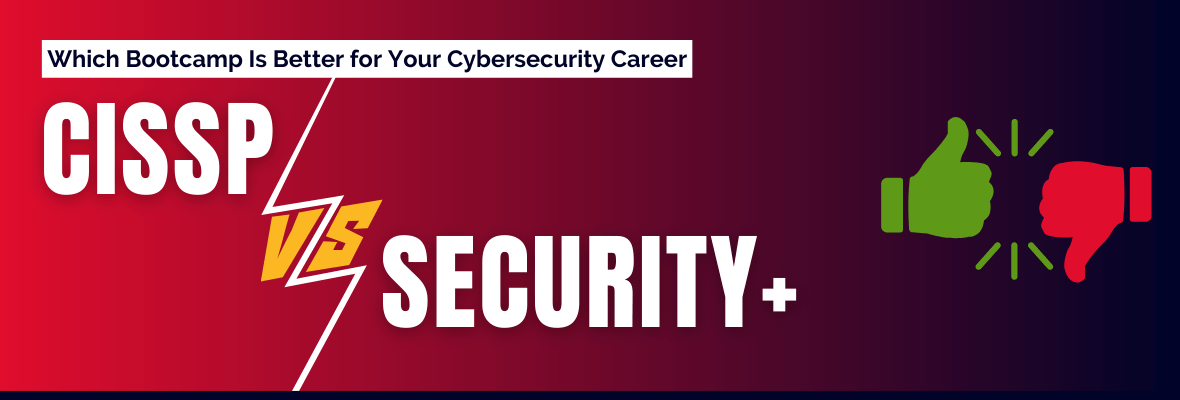CISSP vs. Security+: Which Bootcamp Is Better for Your Cybersecurity Career?
If you are already here, you are most certainly fascinated by the IT security career. You might also know there are certain credentials that can help you develop baseline security skills and stay employable in this fast-evolving industry.
CompTIA Security+ and CISSP are two popular certifications that enable you to land IT security jobs faster. There are numerous CISSP and Security+ bootcamp training programs that promise to help you develop your security skills through hands-on experience. But on what grounds should you make your choice? Which bootcamp would make a safe bet for your career; Security+ or CISSP? Keep reading to find out.
CISSP vs Security+: An Introduction
CompTIA Security+ certification is the industry standard for building a career in IT security. The certificate proves your knowledge and prowess in handling core security functions. Employers trust beginners with CompTIA Security+ certification to perform better than their non-certified counterparts; recruiting officials even use the credential to filter their candidate pool. Some organizations consider the certificate a mandatory credential for their employees.
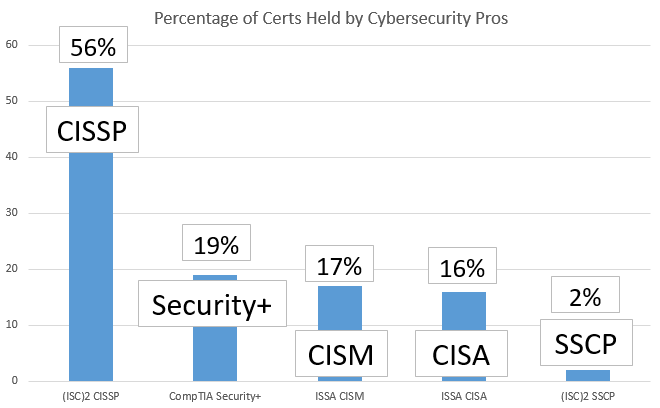
Source: Get Certified Get Ahead
CISSP or Certified Information Systems Security Professional is the gold standard for advanced IT security. It is an international recognition that helps seasoned security professionals boost their careers. Not only does the certificate open more doors for them, but it is also one of the most effective ways to land IT security jobs with impressive earning potentials.
CISSP vs Security+: An Analysis
A study by Global Knowledge reveals IT professionals with IT certifications earn 22 percent more than non-certified professionals. Both CISSP and CompTIA Security+ are two prominent IT certifications in cybersecurity that guarantee attractive pay scales. But how do they differ in terms of prerequisites, industry trends, pay scales, and job prospects? Here is a detailed inspection.
1) CISSP vs Security+: The Prerequisites
To appear for the CISSP certification exam, an IT professional needs five years of experience (cumulative) in two or more of the eight domains CISSP CBK recommends. If you have a four-year degree or a regional equivalent, it gets translated into one year of experience.
The following are the recommended eight domains:
- Security and Risk Management
- Asset Security
- Security Architecture and Engineering
- Communication and Network Security
- Identity and Access Management (IAM)
- Security Assessment and Testing
- Security Operations
- Software Development Security
Your full-time job experience is calculated monthly. That is, you need to have worked 35 hours per week (minimum). Your part-time work experience should be somewhere between 20 to 34 hours a week. Paid or unpaid internships are also acceptable only if the organization you intern at provides the documentation of your work experience.
CompTIA Security+ has no prerequisites.
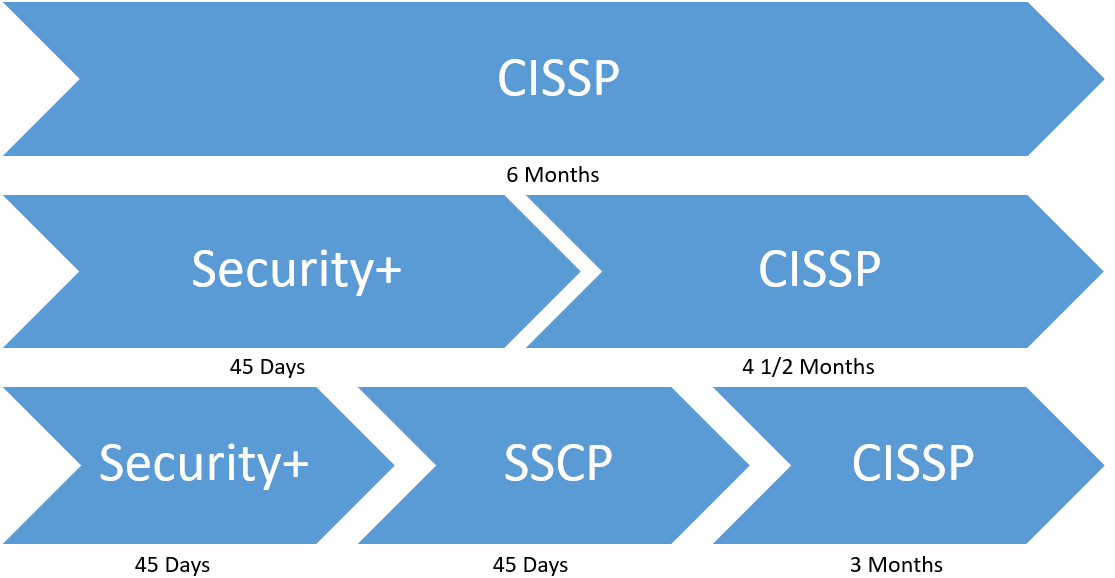
Source: Get Certified Get Ahead
2) CISSP vs Security+ Exams: Syllabi
Though both CISSP and Security+ deal with cybersecurity, the certification exams entail different topics and subject areas. Let’s take a look at the syllabus of each of these certifications.
The following are the main CISSP domains that a well-versed candidate should have:
- Security and Risk Management
- Security Architecture and Engineering
- Communication and Network Security
- Asset Security
- Security Operations
- Security Assessment and Testing
- Identity and Access Management (IAM)
- Software Development Security
The following is the broad spectrum of topics covered in CompTIA Security+ examination:
- Network Security
- Compliance and Operational Security
- Threats and Vulnerabilities
- Application, Data, and Host Security
- Access Control and Management
3) CISSP vs Security+: Job Prospects
CISSP is the ultimate option for candidates who seek higher-level IT security roles. The candidates who earn this credential demonstrate top-notch cybersecurity skills, leadership qualities, and a foundational understanding of complex security strategies. The certification focuses on both management and ground level implementation. That is, a CISSP professional can oversee a cybersecurity project right from the beginning till the end.
During their training period, CISSP candidates get exposure to large-scale real-world information and cybersecurity threats. This helps them develop a thorough understanding of the nature and complexity of cybersecurity. While they may already have developed the base for the same, CISSP training standardizes this knowledge.
The following are the popular roles you can land with CISSP certification:
- Security Director
- Security Analyst
- IT Director
- Chief Information Officer (CIO)
- IT Manager
- Chief Information Security Officer (CISO)
- Security Manager
- Network Architect
- Auditor
- Security Architect
- Security Systems Engineer
CompTIA Security+ is for all aspiring candidates who seek entry-level security roles. In fact, it is one of the safest options for beginners. Of all the reasons to choose Security+ certification, what tops the list is its generalized focus area; candidates need not concentrate solely on security and technology; instead, they can work on the general aspect of security. Employers hire Security+ professionals the most for network and administrative roles.
As the certification meets the requirements of DOD 8570 compliance in both technical level 2 and management level 1, CompTIA Security+ is also the right choice for aspiring government IT security professionals. It is even mandated by the U.S. Department of Defense.
Some of the popular CompTIA Security+ jobs you can land are the following:
- Field Service Technician
- Technical Support Specialist
- Associate Network Engineer
- Desktop Support Administrator
- Data Support Technician
- End-user Computing Technician
- System Support Specialist
- Service Desk Analyst
- Help Desk Technician
Security+ vs CISSP: Salary Trends
Can you earn a decent living with Security+ and CISSP certifications? The answer is yes. There are a number of factors that affect the pay scale of security professionals irrespective of the certifications they have earned, such as years of experience, location, education, job title, and most importantly, their industry.
The following are the top-paying industries for IT security professionals:
- Wholesale Electronic Markets and Agents and Brokers
- Securities
- Commodity Contracts, Financial Investments, and Related Activities
- Scientific Research and Development Services
- Utility System Construction
- Legal Services
According to the Bureau of Labor Statistics’s wage report, CompTIA Security+ certification ranks 10 on the list of the top 20 IT certifications that pay well and CISSP ranks one. That is, CISSP certification salary tends to be higher than CompTIA Security+ salary. New Jersey, New York, Virginia, and Maine are some of the areas in the U.S. where IT security professionals earn the highest.
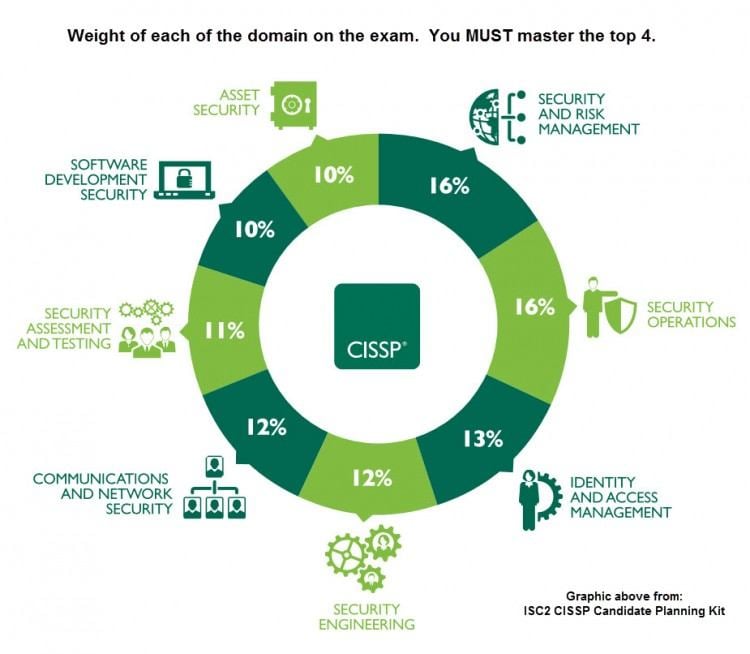
Source: Security Boulevard
The following is the list of popular CISSP roles and the salaries they earn:
- Information Security Analyst — $88,312
- Cybersecurity Engineer — $111,439
- Cybersecurity Analyst — $95,781
- Chief Information Security Officer — $168,895
- Information Security Manager — $120,161
- Security Engineer, Information Systems — $101,163
- Security Architect, IT — $126,221
Here is a list of popular CompTIA Security+ roles and the salaries they earn:
- Network Engineer — $108,000
- Information Technology Specialist — $43,500
- IT Help Desk Technician — $65,000
- IT Technician Level 2 — $38,000
- Help Desk Technician — $45,000
- Computer Repair Technician — $48,750
- Tier 1 Help Desk — $40,000
- Travel PC Tech — $42,900
CISSP vs Security+: What’s Better?
Certainly, any company would choose CISSP over Security+. But what you need to understand is the inherent difference between both of these credentials. While Security+ appeals to professionals seeking entry-level roles, CISSP is for IT professionals who have already gained experience in the industry.
Security+ enables you to take care of core security functions; CISSP equips you to design, develop, implement, and manage simple to complex cybersecurity programs. But you cannot scoff at the Security+ credential. Countless organizations mandate it across all domains. For just about most of the military IT security roles in the U.S., you cannot apply without this certification.
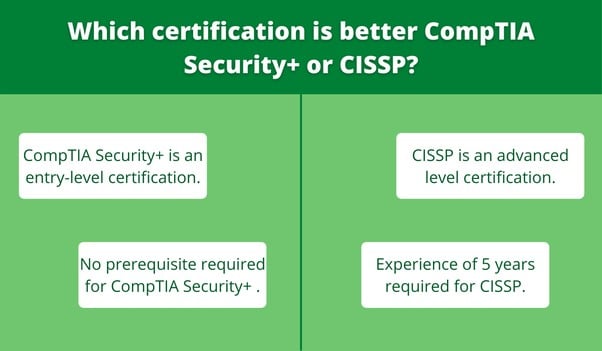
Source: Quora
Ultimately, the kind of training you undergo for either of the certification exams will reflect on your results. While self-paced study is certainly an option, nothing works like the immersive learning environment bootcamps offer.
Why Do You Need To Enroll for Security+/ CISSP Bootcamps?
- Retain Information Better — Both CISSP and Security+ bootcamps can help aspiring IT security professionals retain information better because of applied learning techniques.
- Immersive Learning Environment — Industry experts who facilitate an immersive learning environment lead these bootcamps. Candidates can also access their guidance at will.
- Practical Learning — Security+ and CISSP bootcamps promote result-based study and encourage practical learning. This helps candidates get ample hands-on experience.
- Simulated Tests — Simulated tests and rigorous assessments enrich these programs to help candidates have an in-depth understanding of cybersecurity issues.
- Problem-solving — These bootcamps thoroughly expose students to challenges they are likely to encounter at work so they can hone their problem-solving skills.
- Real-life Examples — The lesson plans have real-life examples and case studies to help candidates stay realistic.
If you are an aspiring IT cybersecurity professional, make sure you jump into the market with the right credential. GreyCampus offers both CompTIA Security+ and CISSP bootcamp training for aspiring candidates.
The Security+ bootcamp training GreyCampus offers is the perfect platform to validate your skills in core security functions by clearing the SY0-601 examination. Industry experts lead the sessions and cover areas such as development and implementation of security policies, measuring network baselines, monitoring cyberattacks, and more.
If you are a seasoned security professional, you can sharpen your information security skills with GreyCampus’s CISSP bootcamp training. What’s in it for you? Veterans lead four to five days of intensive training sessions on implementing and managing cybersecurity programs, unlimited e-learning access for one year, full-length simulated exams accompanied by comprehensive exam analytics, and a lot more!
Want To Kickstart Your Career in Cybersecurity? Get Certified Today!
